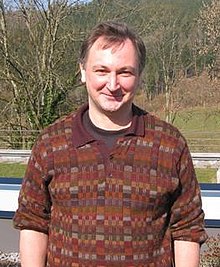Vladimir Voevodsky
| Vladimir Voevodsky | |
|---|---|
 |
|
| Born |
4 June 1966 Moscow, Soviet Union |
| Nationality | Russian |
| Fields | Mathematics |
| Institutions | Institute for Advanced Study |
| Alma mater |
Moscow State University Harvard University |
| Doctoral advisor | David Kazhdan |
| Notable awards | Fields Medal (2002) |
Vladimir Alexandrovich Voevodsky (Russian: Влади́мир Алекса́ндрович Воево́дский, born 4 June 1966) is a Russian mathematician. His work in developing a homotopy theory for algebraic varieties and formulating motivic cohomology led to the award of a Fields Medal in 2002. He is also known for the proof of the Milnor conjecture and motivic Bloch-Kato conjectures and for the univalent foundations of mathematics and homotopy type theory.
Vladimir Voevodsky's father, Aleksander Voevodsky, was head of the Laboratory of High Energy Leptons in the Institute for Nuclear Research at the Russian Academy of Sciences. His mother was a chemist. Voevodsky attended Moscow State University and received his Ph.D. in mathematics from Harvard University in 1992, advised by David Kazhdan. Currently he is a full professor at the Institute for Advanced Study in Princeton, New Jersey.
While he was a first year undergraduate, he was given a copy of Esquisse d'un Programme (submitted a few months earlier by Alexander Grothendieck to CNRS) by his advisor George Shabat. He learnt the French language "with the sole purpose of being able to read this text" and started his research on some of the themes mentioned there.
...
Wikipedia
